|
Joining Hearts in Arts:
The Raz Ram Foundation
By Andrea Uebelhack
Translation by Mariska Haefelfinger
In the
middle of a mixture of different languages which one only finds in
Israel (to be found only in Israel?), I stand amazed and try to take
pictures of a few of the giggling girls. The room is buzzing with
Hebrew, Arabic, Russian and English, approximately 30 women and
girls sit, ran, laugh with each other, kneading, moulding, crafting.
I am in Mrar, a Druse-Arab village in the Northern part of Israel, a
visitor to a project of the Raz Ram foundation.
Amongst all
the women only one man, Aviv, with whom I started out to this trip
to the Galil and who is responsible for this beautiful chaos. He
brought to life the Raz Ram foundation and is both heart and soul of
the project. Aviv is a musician; I met him two years ago in Prague
where he performed together with his brother Arik in concert. In
Prague, I also heard about the foundation, which at that time was
already in existence for a year. Raz Ram devotes itself to orphans
all over Israel, orphans from various parts of society, Jews,
Palestinians, Druses and Bedouins. Aviv and Arik are half-orphans
themselves. Their father, who was a pilot, died during the
6-day-war. At the time, Aviv was 3 years old, Arik was born just a
month later. For Aviv, the drive to care for children from broken
homes arose out of his own experiences.
The day began
early for us, we started from Tel Aviv. On the drive up north we had
time to speak about the foundation in general. The projects in the
north of the country are only part of Raz Ram’s activities. Further
projects are in Jerusalem, Rahat, Kirijat Gat, Rehovot, Nes Ziona,
Tel Aviv and Jaffa. Artists from different backgrounds are involved
in the various projects, but also students from Tel Aviv University,
museums and other public institutions.
But then why
is art the appropriate form of dialogue for projects with orphaned
children, how can a healing process be initiated by activities with
theatre, music, plastic art? Aviv answers with a counter question:
"Do you know the word "chalal" in Hebrew?? "chalal" has various
meanings, it is the description for a dead person, but also the
Hebrew word for "space", "outer space", but at the same time "space"
as in a hole or cavity, void. "Chalal" is not only the deceased, but
also the hollow space, that he leaves behind. A void in the hearts
of the children, but also in the family, the community, the country.
"This void can never be filled", Aviv adds. "It will be the source
for agony and pain in the life of the child, but I think that via a
transformation it can also become a source of energy for creative
activity".
In Mrar
mothers are integrated in the project for the first time.
Originally, this wasn’t the plan, but during preliminary discussions
it became clear that the mothers would like to participate as well.
Aviv, who likes to keep his approach flexible, agreed immediately. A
wise decision; in that way a special encounter was made possible.
The activities in Mrar take place at the local youth centre and are
being looked after by Nada. Nada is the heart and soul of the
centre. A widow herself, she devotes her energy to community work
and to the work with the local women. No other youth- and community
centre in the Arab sector offers that many activities,
presentations, special courses and support for women as does the one
here in Mrar. For the women, most of them widows, the centre is the
only possibility for encounters outside the family.
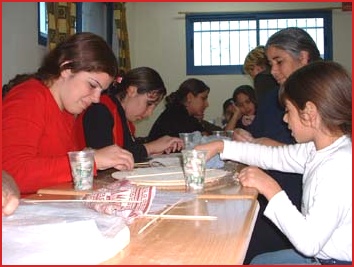
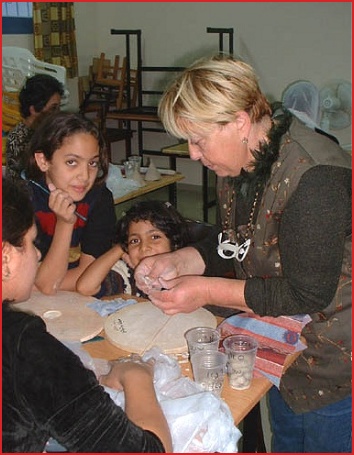
Mila helps the younger girls...
And so it
happens that in Mrar some 30 Druse and Arab (Muslim and Christian)
women and children get together once a week. Nada told me that they
always turn up early and can hardly wait until Mila gets there, too.
Mila is the artist who has been entrusted by Raz Ram with the
supervision of the project. She is Russian and came to Israel 10
years ago. Shortly afterwards her daughter fell victim to an attack
in a bus in Tel Aviv. Mila is a potter and shows the girls and women
various techniques. Plates, cups, Chamsoth or bells, eagerly they
all work with clay, colours and pearls.
At first Nada
was afraid that there might be problems with communication. Mila
does not speak Hebrew particularly well, her husband Vladimir
translates a lot from Russian, the local girls only speak Arabic,
and only some mothers speak Hebrew as well. Surprisingly though, the
exact opposite happened, the group gets on remarkably well with
Mila, the language and the different cultures seemingly being an
encouragement rather than a hindrance. Many other women have already
inquired whether the project will be carried on, and would like to
participate as well.
Aviv
definitely would like to continue the activities in Mrar. This
particular project though should come to it’s special conclusion.
Aviv suggested to find one particular tree in the village and to
decorate it with ceramic bells of the group and which should then
serve as "the tree of life". In Mrar such an idea is even more
symbolic than one might think at fist sight. The women were widowed
not only because the men died in the army, in Mrar there was also an
exceptional amount of car accidents. In addition 10 young men of the
village killed themselves within a relatively short period of time
and hung themselves on the trees of the village; Nada tells us. This
is why from the beginning she was convinced of the idea to have a
"tree of life" with the bells of the orphans and widows.
Unfortunately
time just flew, and already we have to be on our way to the next
stop. Aviv and Nada fix a time to go looking for a suitable tree.
After a warm farewell we leave and drive on to Rama, about 20
minutes by car from Mrar. In Rama, Aviv tells me that it has taken a
long time to get a project on the way. Now the activities take place
in an orphanage, the "House of Love and Peace", which has been run
by George and his wife, a Christian couple, for about ten years now.
By now some 40 children of all ages live there, orphans, but also
children from difficult family backgrounds, who would otherwise life
in poverty and violence, or would simply just live on the streets.
This is where
Ahmed works with a group of 15 children. Ahmed originally comes from
Nazareth and studied drama and performing arts in France. Working
with the children is not only a big challenge, but also a completely
new experience for him. For the children themselves the whole thing
is a unique and challenging experience. A year ago they were guests
at a reception of the Raz Ram foundation, held by state president
Moshe Katzav. This is also were they saw a play which impressed them
deeply. "Next time we’ll be the ones standing on stage" one of the
boys then decided. Aviv had been looking for the right person to
coach them for a long time, until he finally fell upon Ahmed. Ahmed
has now been working with the kids for 4 months and is impressed by
their willpower and talent.
And they
don’t even really know what that is, theatre. They only saw a short
theatre piece once, a year ago, they don’t really know what a stage
is, and they are also afraid to be on stage themselves, cannot
really imagine that this will really come true. Aviv asked them
whether they would like to organize a proper performance with their
play they are working on with Ahmed; here in Rama and maybe also in
other places. Sure, absolutely, was their answer. Ahead of them lies
a proper piece of work, Ahmed says, but they could make it come
true.
Ahmed works
with little text and a lot of pantomime. For the children he put
together a play, featuring freedom as a main subject, a dictator who
suppresses people and has them work for him, who will finally be
defeated, only to then be replaced. Freedom for everybody, Ahmed
emphasizes; it is not a political play, each of the children
represent a different nation, Israel, Palestine, America, Russia,
France and Japan. The pantomime is very demanding on the children,
because they have to bring their imaginations into the play.

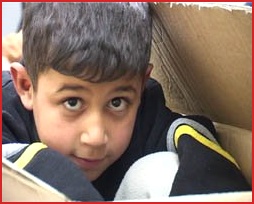 The
whole project demands a lot of the children and consequently brings
them moments of happiness and confirmation. Ahmed told me about a
little boy who started crying when the group applauded him for a
well-done scene. An hour later he came up to Ahmed and told him that
for the first time in his life he had actually been praised for
something. His teacher at school had never actually praised him for
anything, so far. Ahmed, that becomes quite clear, is not the
"teacher", the "adult" who gives instructions; he is a friend and
knows how to deal with children. All the same he does set them
boundaries, so that they realize that the project is for real and is
to be taken seriously. The
whole project demands a lot of the children and consequently brings
them moments of happiness and confirmation. Ahmed told me about a
little boy who started crying when the group applauded him for a
well-done scene. An hour later he came up to Ahmed and told him that
for the first time in his life he had actually been praised for
something. His teacher at school had never actually praised him for
anything, so far. Ahmed, that becomes quite clear, is not the
"teacher", the "adult" who gives instructions; he is a friend and
knows how to deal with children. All the same he does set them
boundaries, so that they realize that the project is for real and is
to be taken seriously.
Ahmed
suggests to let the children attend a performance in Haifa next
week, in order for them to get an impression of what theatre is
about, what a real stage is and to be able to get an idea of the
atmosphere of the theatre. Maybe even a meeting with the actors
could be arranged. After various technical matters have been
discussed, we have to leave Rama, as well. Our day is not yet
finished.
Hurfeish, a
Druse village and the last stop on our trip, so to speak represents
the centre of all projects of the Raz Ram foundation in Northern
Israel. There the connection between the centre and the memory of
the dead, Jad leBanim,
already exists. The project there is finished, some 30 children have
made string puppets, painted them and dressed them. Today they have
gathered to ceremoniously receive the string puppets. It becomes
quite visible how proud the children are of their work, but also
that they are not used to having their pictures taken and being
appraised. The bigger boys play, just like the smaller girls, with
their marionettes, only they turn their heads away bashfully when I
turn my camera on them.
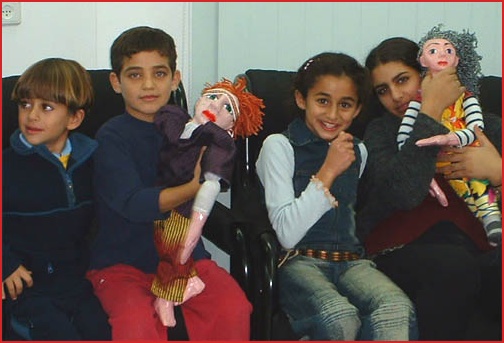
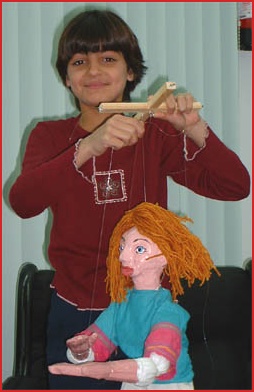
Proud of her work... |
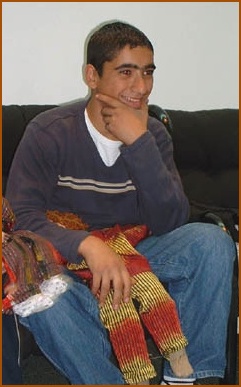
He hopes that I did not see him playing with the
puppet... |
The
conclusion of this project does not mean in any way the end of the
activities of the foundation in Hurfeish. Quite on the contrary, the
foundation stone for the next initiative is in the truest sense of
the word already laid out. Here in Hurfeish, Raz Ram plans the
laying out of a small garden, the "Gan haMa'ajan", garden of the
well. Whilst looking for possibilities for an open air project, Aviv
came across the old fountain near the village. The Druses from the
neighbourhood used to get their water from there before there were
water pipes. Today the place is derelict and has become almost
forgotten.
The idea to
revive the place and work on it together was greeted with much
enthusiasm in Hurfeish. At an afternoon organized by Raz Ram almost
300 children from the area drafted their ideas for a" well-garden".
Of course the ultimate design cannot be left to the children
entirely, but a solution to this has been found, too. 2 years ago,
Aviv tells me, a young woman, an orphan herself, had contacted him
to ask him about possibilities to be of value to the organisation.
For a long time there was nothing suitable to be found until the
idea with the garden came up. The young woman happens to be a
landscape architect, a lecturer at the Technical University of
Haifa, and she is thrilled with the project. The realisation itself
will certainly take some time, but the course has been set, the
project is on its way.
The closure
will be a conference with the title "haGalil, culture of remembrance
and peace", which is intended to promote an international commitment
of the projects of the foundation. Cooperation and support,
idealistically and financially, are essential for the work of Raz
Ram, the project being quite unique in Israel. Even though there is
some sort of support from the various ministries of the government,
the financing of the projects in these difficult times of budget
cuts and economisations is not an easy task. Sometimes the financing
is a bit vague, but the foundation continues to run the projects,
old and new. How could one disappoint the children, who have been
looking forward all summer to the next meeting, by cancelling the
project? And sometimes even one donation is enough to be able to
renew a project.
On the way
back to Tel Aviv, I try to sort out the different impressions of the
day. Particularly astonishing I find the way the foundation manages
to work its way round the bureaucracy, the long waits and difficult
conditions of participation. At this foundation no elaborate plans
are being worked out meticulously over months, no, here things just
get done. And this "just getting things done", brings together and
joins. "Joining Hearts in Arts" is the motto of the foundation,
which is being lived every single moment. Above all I will remember
the laughter and the joy of the children, who are given something
truly special in the countless projects. For one afternoon they
immerse into another world, create, work, fantasize and grow from
it.
Kontakt:
Raz Ram Foundation
Tel/Fax: +972-3-5467246
Email:
a-l@bezeqint.net
http://www.raz-ram.org
Text in
German
hagalil.com
28-02-2003 |